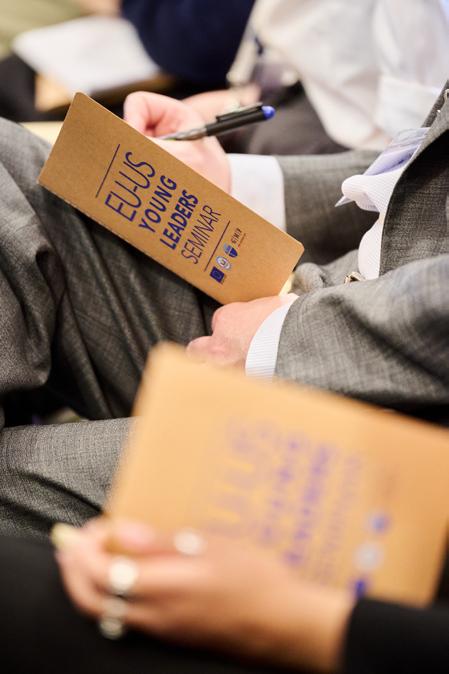

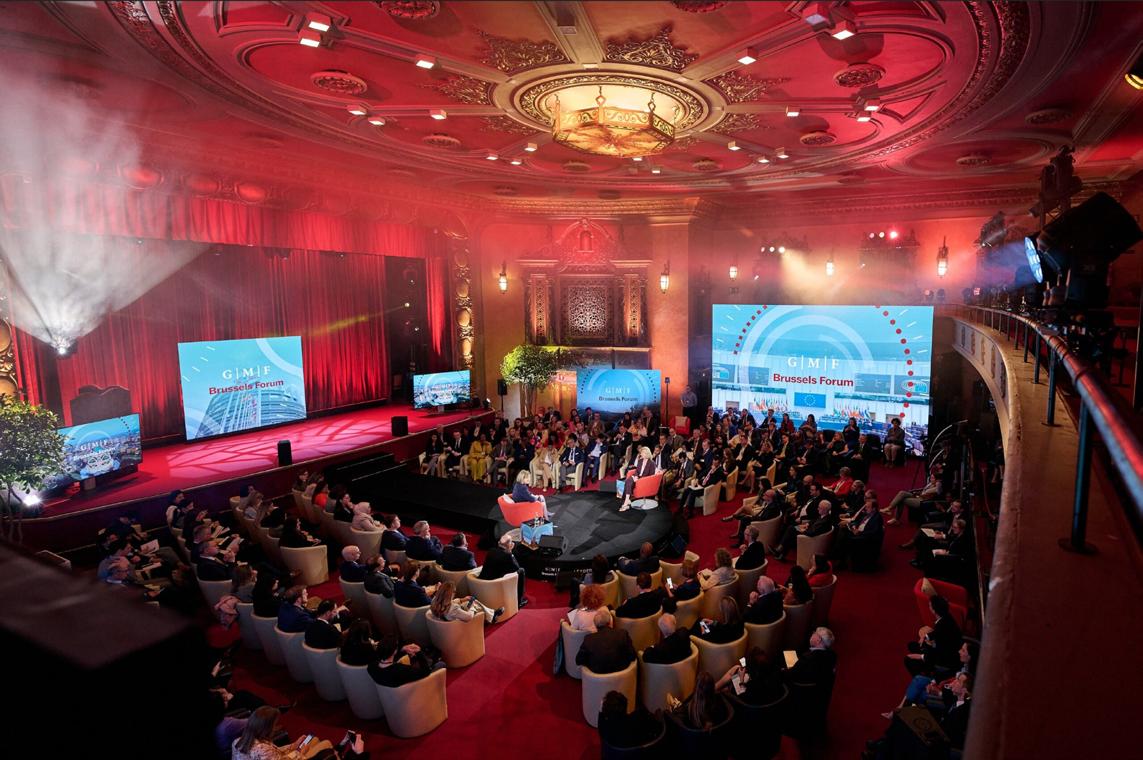





2024 was a pivotal year that heightened the urgency and relevance of GMF’s mission.
First, over half the world’s population voted in a “super election year”, with major races in the United States, the EU, France, the United Kingdom, India, Indonesia, Japan, and Mexico. These contests disrupted the domestic status quo and reshaped debates on security, trade, and the global order. GMF programs were at the forefront of shedding light on these events. Our research, publications, and convening helped clarify and shape discussions on the reasons for the increasing pressure under which democratic governments are coming to address citizens’ concerns.
Second, Russia’s ongoing war against Ukraine further destabilized European and global security. GMF experts led efforts to frame the challenges of Ukraine’s reconstruction and highlighted the risks of waning transatlantic resolve. These colleagues worked to strengthen support for democracy and security, in part through our “Whistlestops for Ukraine” tour across the US heartland, emphasizing the conflict’s worldwide implications, from the Arctic to the Indo-Pacific, along the way.
GMF also played a key role in shaping European foreign policy and supporting European governments as they navigate burden-shifting and evolving US strategic priorities. Our Geostrategy team advanced transatlantic cooperation beyond the Atlantic itself and fostered stronger engagement with like-minded partners further afield. GMF’s trilateral forums with Indo-Pacific partners and Türkiye, and its cross-cutting research on pivotal middle powers, provided fresh ideas for addressing new challenges facing Americans and Europeans.
Third, the rapid pace of technological breakthroughs made global competition in that area a top policy issue. GMF launched its Technology team in April 2024 to help ensure that democracies work together to shape the global technology agenda to protect individual rights.
Finally, the new Allied Strategic Competitiveness team was created to complement our thematic work on geostrategy, democracy, innovation, and transatlantic leadership. The team’s mission—to analyze and recommend ways the United States and Europe can together reinforce their economic security and competitiveness— has become more urgent as tariffs, sanctions, natural resources, and public and private investment are increasingly mobilized to geopolitical ends.
Throughout 2024, GMF responded to global developments with agility and a lasting commitment to deepening collaboration and dialogue among transatlantic partners so that they may effectively address the multiple challenges facing their security, stability, and prosperity.
We look forward to your continued support in this critical endeavor.
Dr. Alexandra de Hoop Scheffer President, GMF
GMF’s mission is to shape a transatlantic partnership fit for the 21st century. As a transatlantic and nonpartisan organization, GMF delivers cutting-edge analysis, develops bold policy ideas, and convenes creative leaders to help governments, businesses, and civil society on both sides of the Atlantic respond to current challenges, and anticipate future ones, while unlocking new opportunities for cooperation.
Headquartered in Washington, DC, with offices in Berlin, Paris, Brussels, Belgrade, Ankara, Bucharest, and Warsaw; representations in London and Madrid; and fellows worldwide, GMF offers unmatched insight into policy and political dynamics across the Atlantic and beyond. This unique expertise network enables us to drive practical solutions to national, regional, and global issues, and to strengthen transatlantic cooperation on emerging challenges.
GMF’s policy work centers on three core priorities: advancing transatlantic economic and technological competitiveness in a shifting global order, strengthening transatlantic and global security, and revitalizing democracy. All GMF research is available on its website.
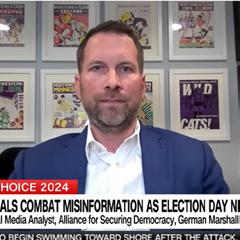


As many countries in the transatlantic community and beyond held elections, GMF Democracy focused its work in 2024 on combating threats to democracy and the abuse of new technologies. Both issues posed challenges to democratic values, in particular election administration. GMF Democracy shed light on widespread efforts to manipulate online information and interfere in elections while helping to secure individual rights and freedoms.
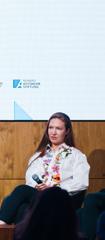
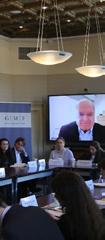
2024 saw an already complex US information environment become increasingly opaque, fragmented, and subject to foreign meddling. To broaden understanding of these threats and reveal covert efforts to obscure sources and spread propaganda, the Alliance for Securing Democracy (ASD) at GMF unveiled the Information Laundromat, an open-source tool that uncovers content and metadata similarities among websites. The Laundromat allowed ASD to discover links between Russian state media and seemingly unassociated websites that promoted almost verbatim the same content. These platforms included Polish far-right blogs, websites dedicated to “men’s interests” and spirituality, and several Spanish-language websites
ASD experts also analyzed, among other topics, false narratives on US election integrity, posts published by adversaries of the United States about the first attempted assassination of Donald Trump, and commentaries by Democratic and Republican candidates on threats to American democracy. These efforts provided insight into the domestic US discourse on democracy and the ways in which adversaries of the United States sought to sow division in the country by amplifying polarizing debates.
ASD sought nontraditional partnerships and audiences for its work, piloting a partnership with the Cyber Collective, a community of more than 1,000 online influencers with an interest in digital hygiene and responsible online behavior. The group provided an ideal audience at a time when content creators are increasingly in the crosshairs of foreign influence operations. ASD and the Cyber Collective convened content creators and election officials in Philadelphia to discuss the ways in which foreign adversaries of the United States target influencers online. The two organizations also created guidance for influencers to protect themselves and their audiences during the US election cycle, including by amplifying content from election officials and other trusted sources.

More than half the global population cast ballots in 2024 races marked by seismic changes in voter sentiment and ideological landscapes. Europe’s rightward shift, driven by rising populism and nationalist rhetoric, epitomized the prevailing political tides and reflected deep-seated anxieties over migration, economic stagnation, or cultural identity, as well as a pervasive antiincumbent mentality. Crucially, this dynamic was not merely about political preferences but represented a broader reckoning with institutional trust, social divides, and demand for radical change.

In the United States, issues such as trust in the election system and usage by adversaries of the United States of new tools for manipulation, coupled with increased domestic polarization and politicization, created a fraught environment. ASD highlighted the rise of coordinated threats targeting election administration and worked to equip election administrators with tools and strategies to address challenges ranging from harassment to the emergence of artificial intelligence (AI), and to ensure secure election management. Recognizing the heightened threats from adversaries of the United States, ASD also conducted public awareness campaigns on tools and tactics that these actors
used to undermine democratic resilience and electoral integrity. With GMF Technology, ASD released the AI Election Security Handbook , which offered officials a framework for incorporating AI threats into the work of election administration and recommended ways to use the new technology to ensure fair and secure voting. ASD experts also “pre-bunked” false election narratives on the election process and provided journalists with guidance for discussing statebacked information operations that aimed to undermine trust in the US presidential election.
This volatile atmosphere underscored the urgency of ASD’s mission. Throughout this “super election year”, the team provided critical and timely research and analysis. Publications offered insights into countering threats to European Parliament and EU member-state electoral processes in addition to those in the United States.
By blending data-driven analysis with actionable recommendations, ASD illuminated challenges for decision-makers, experts, and the wider public, emphasizing the urgent need for better policy and better understanding of threats during a landmark year for global democracy.

Anti-corruption and governance reform has been at the heart of Ukraine’s ongoing journey from post-Soviet oligarchy to modern European
democracy free of foreign and domestic malign influence. Although Ukrainians drive the reform process, partnership with the international community is essential if their country is to survive as an independent entity. To help connect Ukrainian stakeholders with international partners, GMF houses the leading international team of experts dedicated to research on and coalition-building for advancing governance reforms in Ukraine. This team, based in Brussels, Kyiv, and Washington, DC leads regular convenings of the Ukraine Reform Working Group, hosts delegations of Ukrainians visiting US and European capitals, and conducts leading research on issues associated with Ukrainian recovery and EU accession.
Autocrats have been on the march for more than a decade, challenging the political primacy of transatlantic democracies whose great strength is their broad range of international allies and domestic civic actors committed to preserving freedom and rule of law. GMF taps into these actors’ experience by bringing them together to learn from each other and to collaborate on bolstering common values through the Transatlantic Democracy Working Group. This international coalition of former senior government officials, lawmakers, and civil society leaders coordinates efforts for educating the public and current policymakers about foreign and domestic autocratic threats to democracy.

A vibrant civil society is an essential prerequisite for resilient democracy. However, democratic backsliding, social polarization, and political autocratization challenge the vitality of civil society across Europe. In response, GMF’s Transatlantic Trusts have substantially stepped up their assistance to civil society through grantmaking, capacity-building, and networking. Among other initiatives, the Engaging Central Europe program provides systematic funding,
skills training, and resilience support to civil society in eight Central European countries. Programming includes incubating small and emerging civil society organizations and informal groups in peripheral and rural areas, strengthening the legal and institutional resilience against shrinking civic space, and fostering collaboration to promote anti-corruption efforts and the rule of law.
Local actors are as critical as international observers to short- and long-term election monitoring. Civil society informs the public about electoral improprieties and empowers voters through information and mobilization campaigns. In so doing, civic initiatives and organizations contribute to election integrity and challenge
authoritarians’ manipulation of voting. In April 2024, the Black Sea Trust for Regional Cooperation launched ProElect, a European Commission-funded project that promotes democratic elections in six Eastern Partnership countries through greater participation and capacity of civic actors.
The Balkan Trust for Democracy launched Media Fund Serbia in October. Funded by the Norwegian foreign ministry and the Swiss government, the fund supports civil society organizations in Serbia’s media and information
environment through grantmaking and capacity building. The effort enables these organizations to provide input for legislation and policy, offer crisis support to media outlets, improve citizen access to information, and bolster media literacy.
Twelve young policy experts from Central and Eastern Europe and the Western Balkans were awarded 2024 ReThink.CEE Fellowships. Over one year, this seventh cohort of fellows conducted policy research on regional challenges to democracy, security, and prosperity. GMF supported them with funding, workshops, capacity-building, and networking opportunities.
Their predecessors in the 2023 cohort completed their fellowships with a series of policy reports covering Roma refugees fleeing the war in Ukraine, AI policies in illiberal democracies, the impact of advanced military technologies’ on human rights, the role of the Bucharest Nine on NATO’s eastern flank, Russia’s shifting influence in the South Caucasus, and industrial policy in Central Europe. ReThink.CEE fellows also contributed analyses of ongoing political developments in Central and Eastern Europe and the Western Balkans.

In a powerful display of art and politics, the Fund for Belarus Democracy brought together playwrights from Belarus, Ukraine, Russia, and Germany to stage theatrical productions about civic courage in their countries. Their plays traced the resilience of Ukrainian women under Russian occupation, a Belarusian journalist’s
quest for truth under dictatorship, grassroots Russian resistance at home and in exile, and digital defiance and cyber activism. These powerful stories from Eastern Europe were produced with support from the German foreign ministry and staged at the Maxim Gorki Theatre in Berlin in December.

The Transatlantic Foundation Transatlantic Trusts Grants in 2024
The Transatlantic Foundation (TF) is the European and EU-registered arm of GMF based in its Brussels office. TF’s purpose is to independently promote better cooperation and understanding between the United States and Europe on transatlantic issues and the world, and to support democratic reform and resilience across the transatlantic community. TF administers five innovative assistance mechanisms collectively known as the Transatlantic Trusts.
They are:
› Balkan Trust for Democracy
› Black Sea Trust for Regional Cooperation
› Engaging Central Europe
› Fund for Belarus Democracy
› Ukraine: Relief, Resilience, Recovery
$8.7 Million in Funding
341 Grants
Throughout its existence, Brussels Forum has innovated convening and networking. In 2024, GMF dedicated its flagship annual conference to “Atlanticism in Action”. This is a guiding theme for GMF, which uses a democratic and alliance-based lens to assemble its global and local networks of policymakers, private-sector visionaries, experts, and community leaders, and helps them navigate an increasingly complex global and technological realignment. Brussels Forum conversations focused on driving new thinking and actionable solutions, with a spotlight on disruptive ideas. Speakers included former US Vice President Mike Pence, NATO Deputy Secretary General Mircea Geoană, US Senator Chris Murphy, European Commission Vice President Vĕ ra Jourová, Belgian Foreign Minister Hadja Lahbib, and US Assistant Secretary of Defense Celeste Wallander.
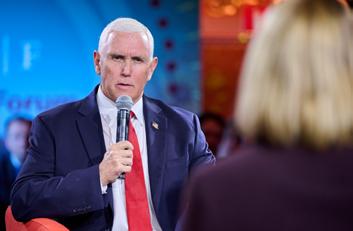






318 participants, 70% of whom were first-time attendees since the return to in-person convening
48% of participants were women
38 different nationalities represented among participants
43,000 video views on social media platforms
31,217 website page views on conference dates (April 18-19)
51 journalists in attendance
396+ media mentions within 10 days of the conference





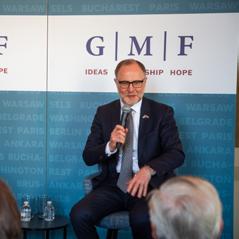
GMF Geostrategy provides policymakers and business leaders on both sides of the Atlantic with in-depth and comprehensive analyses of the political, economic, and strategic trends that impact them. GMF Geostrategy divides its portfolio into five areas: GMF East, GMF North, GMF South, GMF Indo-Pacific, and GMF Risk and Strategy, with team members based throughout the organization’s offices.
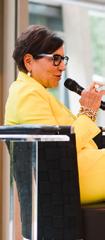


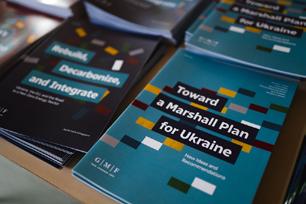
GMF research on display at “All
GMF East in 2024 built upon its existing work on Ukraine by releasing three major publications—“A Smart Specialization Strategy for Ukraine: Recommendations to Spark an Economic Rebound After the War ”, “ The Power of Partnership: International Supporters of Ukraine’s Local Reconstruction”, “ Rebuild, Decarbonize, and Integrate: Ukraine, the EU, and the Road to a Net-Zero Energy Sector ”— that shaped the debate ahead of the Ukraine Recovery Conference (URC) in Berlin. GMF East also partnered with the German Ministry for Economic Cooperation and Development to host “Rebuilding Ukraine’s Human Capital”, an official URC pre-conference event. The gathering convened experts and stakeholders from Ukraine and its international partners to address the country’s short- and long-term development needs. During the URC itself, GMF East played a prominent role, hosting two impactful events—“All Reconstruction is Local ” and “Ukraine’s Recovery and the Role of the Private Sector”—that led participating representatives
from government, civil society, business, and academia to craft practical and innovative strategies for Ukraine’s recovery.
GMF East took center stage at the Warsaw Security Forum in 2024, contributing to crucial discussions on Ukraine’s defense and integration into transatlantic frameworks. Managing Director Michał Baranowski moderated a high-profile panel, “Impact of the NATO Washington Summit on the Eastern Flank”, that explored the ways in which that meeting’s outcomes bolster Eastern Europe’s security architecture and Ukraine’s path toward NATO integration. GMF East also spearheaded a brainstorming seminar that generated actionable recommendations on incorporating Ukraine into the transatlantic defense industry, with a focus on enhancing the country’s military capabilities and fostering industrial collaboration. The team also provided policymakers on both sides of the Atlantic with timely briefings on critical issues including donor coordination, war insurance, anti-corruption, and the green energy transition.
GMF East hosted its second in-person Polish-German-American Trilateral Seminar in Warsaw, bringing together 20 high-level government officials and experts from Poland, Germany, and the United States. The seminar provided a platform for confidential discussions on critical issues, including the challenges facing European defense, the future of the transatlantic alliance, and strategies to advance Ukraine’s integration and security in a rapidly shifting geopolitical landscape.
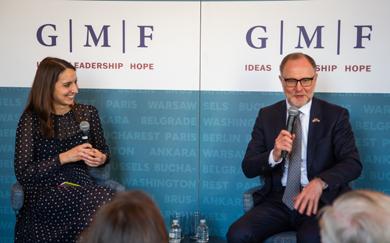
GMF North in 2024 deepened transatlantic understanding of security and geo-economic challenges through analysis and programming.
NATO’s 75th anniversary summit and public forum in Washington, DC and the foreign policy debates around the US presidential election provided the team with opportunities to shape American policymakers’ thinking about the alliance’s responses to Russia’s aggression in Europe and about resilience to adversaries’ hybrid threats, including those to critical infrastructure. GMF North led a delegation

of American defense and security experts to Germany and Latvia to learn about European strategies to address challenges that Russia poses, including hybrid threats that the United States also confronts. In Latvia, on NATO’s eastern border, US security experts were briefed on the country’s push to stop Russian and Belarusian efforts to weaponize waves of migrants. Participants also received briefings on Kremlin activities to sabotage Europe and NATO’s robust transformation on its eastern flank.
The transatlantic relationship reaches beyond capitals, and GMF North’s Across America initiative reinforced transatlantic ties by bringing European ministers and national and regional parliamentarians to communities throughout the United States. Trip highlights included conversations with Iowa Governor Kim Reynolds and state legislators on weapons manufacturing in the US Midwest and the region’s contributions to European efforts to rearm. Other highlights included visits to energy-producing facilities and universities in Pennsylvania and West Virginia to learn about natural gas and geothermal energy, and visits with state and military officials in the US Pacific Northwest to discuss the impact of cooperation between Russia and China on strategic and nuclear security.
GMF North conducted long-form research on emerging trends in defense and security. Two US-government funded research projects on Russia-China cooperation in the Arctic and hybrid threats against subsea infrastructure provided new details on the behavior of adversaries, helping to shape US and allied preparations for future potential threats from them. Additional reports from GMF North provided the foundation for a series of briefings to the US administration, the US Congress, NATO, and EU stakeholders.
Ongoing crises in the Middle East and Africa underscore the importance of developments in the Mediterranean, Türkiye, and the southern Atlantic to transatlantic interests, in part due to Russian and Chinese policies that affect security and economic development there. In 2024, GMF South continued to build on a 15-year track record of bringing a sustained transatlantic approach to debate and analysis on these critical issues. Key partners for this portfolio included Compagnia di San Paolo, the Policy Center for the New South, the Alexander Philon Fund for Transatlantic Partnership, TÜSİAD, Koç Holding, the Swedish Ministry for Foreign Affairs, the Union of Chambers and Commodity Exchanges of Turkey, and NATO.
In June, GMF South convened the 24th edition of the Mediterranean Strategy Group, bringing together 40 NATO, EU, and national officials, experts, and business leaders for discussions on “Connectivity for the Wider Mediterranean”. New infrastructure projects were high on the agenda, alongside threats to critical undersea links and the role of connectivity in energy transitions. With a similar format, the team also convened Atlantic Strategy Group meetings in Rabat and Washington, DC. These gatherings explored issues and strategies beyond North America and Europe to include the “wider Atlantic” of Latin America, the Caribbean, and Africa.
GMF’s Ankara office led the 22nd convening of the Trilateral (US-Türkiye-Europe) Strategy Group in Stockholm in the immediate wake of the US presidential election. Discussions focused on the future of European security, including the consequences of the ongoing conflicts in Ukraine and the Middle East, and the outlook for US foreign policy. Many of GMF’s other offices joined in hosting a related series of in-person and online conversations that explored the impasse in Turkish-EU relations and the troubled relationship between Washington and Ankara . Drawing on in-house expertise and a wide network of officials and observers, GMF South has been especially active in the transatlantic debate on Türkiye.
GMF South experts published widely on NorthSouth relations, critical infrastructure, and NATO and EU strategies toward the South. This work contributed to related discussions at the 2024 NATO Public Forum and the alliance’s expert group on strategy toward the southern neighborhood. GMF South experts were also frequent contributors to media commentary on all these topics.

The 24th convening of the Mediterranean Strategy Group on Connectivity for the Wider Mediterranean, Rome, June 4-5, 2024. Credit: Hermine Sam

The 22nd Trilateral Strategy Group on Reimagining the Future: Critical Choices for Europe, Türkiye, and the United States, Stockholm, November 20-22, 2024. Credit: Ceylan Canbilek
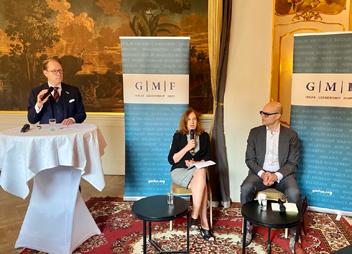
Foreign Minister

Keynote speakers Swedish State Secretary for Foreign Trade Håkan Jevrell (center) and Indian Ministry of External Affairs Secretary West Tanmaya Lal (right) talk with GMF Indo-Pacific Senior Fellow Garima Mohan at the 25th India Trilateral Forum. Credit: Pradeep Kumar/ Bhartiya Studios and Printers
With growing recognition of the close linkages between security and prosperity in Europe and the Indo-Pacific, GMF Indo-Pacific’s trilateral convenings have become ever more valuable and important. These gatherings, which use GMF’s signature track 1.5 format, bring together stakeholders from the United States and Europe with select partners in Asia. In 2024, the Indo-Pacific program organized two India Trilateral Forums, two Stockholm China Forums, one Taiwan Trilateral Forum, and one Japan Trilateral Forum. Each brought together senior officials, experts, and businesses for in-depth, policy-focused discussions of shared challenges
and potential solutions. Highlights included an opening address at the 30th Stockholm China Forum by US Deputy Secretary of State Kurt Campbell. Swedish Foreign Minister Tobias Billström opened the 24th convening of the India Trilateral and the 29th iteration of the Stockholm China Forum. Held around the US presidential elections, the trilaterals focused on implications of the second Donald Trump administration for American allies and partners in Europe and the Indo-Pacific. They also identified synergies among the United States, the EU, India, and Japan for dealing with China-related challenges on trade, technology, and economic security.
GMF Indo-Pacific completed in 2024 a wide range of activities on Taiwan. To strengthen transatlantic cooperation with the island, GMF led a high-level delegation of Americans and Europeans to Taipei for a visit focused on Taiwan President Lai Ching-te’s Whole of Society Defense Resilience program. GMF Indo-Pacific also held two in-person meetings and two online sessions of its US-China Dialogue on Taiwan to discuss ways to manage rising tensions in the Taiwan Strait and US-China differences over Taiwan, and issued a highly influential report
on China’s distortion of UN General Assembly Resolution 2758. The “China Global” podcast recorded 25 episodes on crucial issues in Chinese foreign and security policy that have implications for the United States and Europe.
GMF Indo-Pacific also continued its work on countering China’s political interference in Europe and secured funding to expand its research and convening activities for local and regional European officials.
In 2024, GMF Risk and Strategy continued to develop its research activities with policymakers on both sides of the Atlantic and to expand its risk advisory work for the private sector. Its “ Pivotal Powers ” report, a follow-up to the team’s 2023 Global Swing States initiative, offered original recommendations for improving US and European strategic engagement with the “Global South” in the fields of global governance, security policy, and artificial intelligence. The results of GMF Risk and Strategy’s European competitiveness initiative were published in the widely acknowledged “ Keeping Europe Competitive” report. The team also produced newsletters on the 2024 EU elections and US elections, with each issue featuring several original GMF analyses.





The team’s risk advisory work comprised written and in-person geopolitical briefings to corporate partners and the production of original graphs and maps on issues such as conflicts in Ukraine and the Middle East, elections in Europe and the United States, and key technological innovations and legislation. Companies on both sides of the Atlantic partner with GMF Risk and Strategy to gain deeper insight into global political, economic, and security developments.
Focused on the Russian invasion of Ukraine and the transformation of the transatlantic security environment, the “ Transatlantic Security Task Force” convened in April to contribute to the preparatory work of NATO’s Washington, DC summit. Participants included high-level representatives from a dozen alliance member countries who addressed issues related to European collective defense and strategic partnerships with Indo-Pacific actors. GMF’s Berlin office hosted several off-the-record gatherings that examined the future of the transatlantic partnership. GMF Risk and Strategy’s working group on Germany’s role in a rapidly changing global order, chaired by the country’s former foreign minister, Joschka Fischer, explored how Berlin

can adapt to new strategic challenges. The Risk and Strategy team also worked to strengthen German-American ties by bringing together members of Congress and the Bundestag for open exchanges on the future of Atlanticism, and by organizing meetings and conferences for former and current European and American decision-makers, and journalists, to discuss the US general election.
GMF Risk and Strategy launched a new “Weimar” initiative to develop common policy proposals on the future of the European security order. The French Ministry of Foreign Affairs hosted in November a first discussion among officials, experts, and corporate representatives from France, Germany, and Poland, the beginning of a yearlong program to strengthen cooperation among the three countries.



public transportation system, but also that it would actually increase access to opportunity for the thousands of residents of color and families with low incomes who live along the route.68
This collaborative focused on using the ten-year planning and construction period to assemble resources to finance new housing and prevent displacement along the route (the collaborative also worked on supporting small business and workforce development). Thanks to a combination of philanthropic grants, LIHTC support, new mezzanine loans from a community development financial institution, and a local land bank, the group added or preserved more than 3,500 housing units along the line between 2011 and 2016. The group
also provided support for almost 1,000 households to remain in their homes.
At the same time, organizers associated with the collaborative fought to ensure that the Green Line itself would guarantee better transit service to the neighborhoods impacted. Faced with challenging FTA cost effectiveness rules, the local transit agency claimed it had to eliminate stations planned in some of the lowest-income portions of the line. Organizers fought back to ensure that the project would guarantee access to the housing—and the people living in that housing—along the route.69 They won, showing how integrated planning can produce more effective, pro-housing outcomes along public transportation alignments.


16
GMF Innovation incubates policies and practices that advance democratic competitiveness and values in transformative emerging technologies, industrial policy, restorative economies, and climate justice. Cities play a significant role in spurring new thinking in these areas. GMF Innovation advances this process by conducting research and projects, and developing initiatives, through its two key divisions—GMF Cities and GMF Technology. Team members are based throughout the organization’s US and European offices to ensure a comprehensive transatlantic approach.
GMF Cities stewards initiatives that explore key transatlantic issues through high-impact gatherings, peer exchanges, and applied research. The team has an extensive and successful history of working cooperatively with public-sector, private-sector, and NGO leaders to apply their insights to improve local and regional policies and programs. In addition to supporting policy innovation, GMF Cities helps participants expand their transatlantic networks, broadening their policy expertise, and developing their leadership skills.
In 2024, GMF Cities led a public diplomacy project, Whistlestops for Ukraine, to discuss with groups in the American heartland the reasons a free and sovereign Ukraine is important for the United States. The effort comprised 50 events in nine states that engaged nearly 1,900 individuals from multiple walks of life: farmers, business leaders, students, veterans, elected officials, local chapter members of international clubs, Ukrainian migrants and expats, and journalists.
The project’s four achieved goals were: to highlight how supporting Ukraine improves US security and prosperity; to showcase ways in which American communities have mobilized local support; to provide background and insight for discussions on Ukraine in local, national, and global conversations; and to foster champions for Ukraine among Americans.



met with 14 mayors, 5 governors, and state senators and representatives, city council members, and county commissioners
met with 36 US veterans with first-hand knowledge of the importance of fighting for freedom
met with 140 business leaders from chambers of commerce and other privatesector community groups
met with 206 community leaders who are also members of World Affairs Councils of America, foreign relations organizations, and sister-city commissions
met with 116 agricultural representatives (agribusiness; farmers, farmer unions, and farm bureaus; state departments of agriculture) in addition to 350 agricultural producers/farmers at the Top Producers Summit in Kansas City
Daylong whistlestop tours in 9 US states Colorado, Iowa, Kentucky, Michigan, Minnesota, Missouri, Ohio, Oklahoma, and Pennsylvania— led to 50 events with 1,900 local community representatives in 19 cities and metropolitan areas.
with Rotary International as a key Whistlestops partner, met with 582 Rotarians
amplified the contributions of 256 members of Ukrainian organizations involved in migration and refugee issues and other activities to support Ukrainians and Ukraine
heard from 20 religious leaders representing various faiths and denominations
visited or secured involvement of several nonprofit organizations (including Protez Foundation, Heart-to-Heart International, and Operation Ukraine) and met with social service leaders (including from Catholic Charities and the World Union for Progressive Judaism)
followed by 33 local, national, and international reporters from print, radio, and television media outlets including PBS, USA Today, MSNBC, Politico, The Times (London), FranceTV, ZDF (German public television), The Kyiv Independent, and the Farm Journal

By Yonah Freemark
Disinformation is a global challenge with profound impact on cities. Understanding its spread and effective responses to that threat are critical for city governments. Familiarity with both issues, however, is essentially confined to the national and international levels and not readily accessible or usable for city officials. GMF Cities, the Melbourne Centre for Cities, and other partners developed a response playbook to help inform and guide policies and practices to counter disinformation and strengthen democracy. The playbook was created with input from more than 40 representatives of cities, the media and technology sectors, civil society, and academia from North America, Europe, and Australia.
Housing affordability is a high priority for cities on both sides of the Atlantic, and exploring barriers to adequate housing stock was at the core of a GMF Cities initiative that brought together a group of city representatives from the United States (Atlanta, St. Louis, Seattle) and Germany (Berlin, Frankfurt, Munich) for a series of meetings. A concluding report focuses on key strategies for publicly led housing development, and a recently published Cityscape journal article outlines some of the creative development tools used in Germany. In late 2024, the US Department of Housing and Urban Development acted to overcome barriers to housing development with financial awards to 21 American cities.
in June 2024, GMF Cities brought together 30 community stakeholders from 11 countries for a second forum on Cities Fortifying Democracy The gathering was held in Barcelona, Europe’s first official Capital of Democracy, and participants included researchers, civil society leaders, and city practitioners. In-depth discussions focused on topics including youth disenchantment with democracy, multiracial inclusive communities, and building common ground to combat polarization. Participants spoke of promising practices to address these issues.

They also explored the role of cities in increasingly authoritarian societies, the importance of local leadership in addressing community fracture points, and the possibility of using futurefocused design for municipalities, all of which will help shape projects in the years ahead.

GMF Technology was launched in April 2024 with a mission to help ensure that democracies win the global strategic technology competition against autocrats. The program united staff with expertise in technology issues from the Alliance for Securing Democracy and the former GMF Digital.
GMF Technology has three research pillars: artificial intelligence (AI) and democracy, EU-USChina technology competition, and allied coordination and competitiveness.
To strengthen mutual understanding among policymakers and stakeholders on both sides of the Atlantic, GMF Technology hosted a weeklong exchange tour of the United States for 12 members of the European Parliament engaged in technology issues. The delegation visited Austin, Sacramento, and Washington, DC to meet with key American players in technology and innovation policy, and to compare US and EU innovation ecosystems. GMF Technology published detailed insights from the tour.
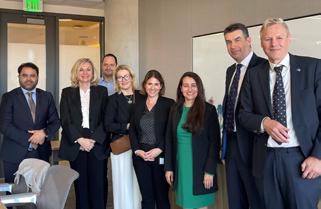



GMF Technology launched the 2024 Elections Content Credentials Repository in partnership with the Canadian Broadcasting Corporation (CBC) and Mexican photojournalist agency Obturador MX. Content credentials hold information related to the production or alteration of an image, including with AI. Users can click on an icon on an image to open a window that contains background information, or the content credentials, related to that image. A repository of such content-credentialled images provides users with more context about the media they encounter online. This, in turn, can contribute to the digital ecosystem’s trustworthiness.
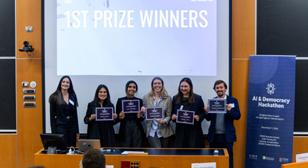
In another effort to improve trust in the digital ecosystem, and thereby help safeguard democracy, GMF Technology also hosted in Mexico City GMF’s first hackathon. This gathering brought together innovators to develop and pitch AI-driven methods to increase online transparency and safety. Prototype solutions developed during the event included a media literacy game that trains students to identify AI-generated images and a support service for gender-based digital violence that incorporates facial recognition technology and automated search to identify deepfakes and other harmful content.
The 2024 Elections Content Credentials Repository, located on GMF’s website, showcases authenticated images from CBC’s and Obturador MX’s coverage of the year’s elections in Mexico, India, Canada, and the United States. It offers examples of ways in which the authenticity of online images can be confirmed.


In partnership with Microsoft and the EU Cyber Direct Project at the EU Institute for Security Studies, GMF Technology hosted the 4th annual European Cyber Agora (ECA). The event serves as a platform to foster dialogue and collaboration among government, civil society, academia, and industry representatives on Europe’s technology policy agendas. This latest gathering featured four workstreams exploring the future of multi-stakeholder cyber diplomacy, EU cybersecurity policy, AI and transatlantic alignment in geopolitics, and the role of the private sector in hybrid conflict.


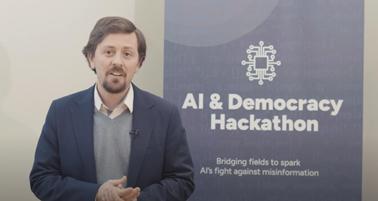
In its inaugural year, GMF Technology hosted seven events, released 18 publications, welcomed two visiting fellows, and garnered more than 50 media mentions in outlets such as The New York Times, The Washington Post, Bloomberg, and Deutsche Welle. GMF Technology also participated in two high-profile US congressional testimonies . The first, before the Senate Committee on Banking, Housing, and Urban Affairs, focused on ways the United States can use export controls, investment screening, and transatlantic cooperation to outpace China in emerging technologies. The second, before the House of Representatives Committee on Energy and Commerce’s Subcommittee on Communications and Technology, addressed strategies for securing US communication networks against foreign adversaries.
Among GMF Technology’s initial products were its Spitting Images deepfake tracker, an interactive map monitoring AI-generated content in elections; a data-driven report that analyzed TikTok’s use in US presidential, congressional, gubernatorial, and secretary of state campaigns;

and “ The ASD AI Election Security Handbook ”, a resource for US election officials who encountered AI-created content during the presidential campaign and, in the longer term, want to leverage the technology and use it responsibly.

Democracies are losing the economic long game.
Remember the Transatlantic Trade and Investment Partnership? That ambitious US-EU trade deal? It died a slow, painful death due to public concerns around regulatory sovereignty. Meanwhile, Beijing’s Made in China 2025 plan and its Belt and Road Initiative are reshaping global infrastructure and influence.
The rules-based order is eroding, leaving a vacuum that rivals are all too eager to fill. Post–World War II institutions are creaking under the weight of 21st-century challenges. The World Trade Organization is stuck, unable to address modern trade issues, and other multilateral institutions are on borrowed time as transactional deal-making replaces alliances.
Hard power is replacing soft power, and economic tools such as tariffs and access to the US market are being weaponized against allies and enemies alike. Mixing economic and security goals requires a delicate balance.
The United States, Europe, and other like-minded partners of the transatlantic community need an allied strategic competitiveness initiative aimed at safeguarding their economic well-being and prosperity. It is time for “radical change”, as former Italian Prime Minister Mario Draghi noted in his European Commission report on competitiveness.
GMF began to explore these issues in 2024 with its groundbreaking “ Keeping Europe Competitive ” report and, in 2025, will dig further into the issues that underpin strategic competitiveness. Allies need to promote, partner, and protect: promote their individual competitiveness via right-touch regulatory issues, taxation, and policies that attract investment; partner on actions that can boost collective competitiveness; and protect critical technologies from economic coercion and theft of innovations.
The core principles of this GMF initiative will boost individual and collective competitiveness while aligning economic policies and encouraging collaboration among allied nations. These efforts to boost prosperity are critical to advancing security and preserving democracy.



For more than 40 years, GMF Leadership Programs has cultivated the next generation of leaders’ understanding of and commitment to the transatlantic relationship. Participants come from all societal sectors and are at various stages of their careers, with several years to decades of professional experience. Programming focuses on in-person, immersive exchanges designed to foster 21st-century leadership skills.
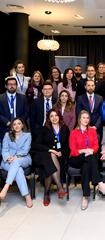
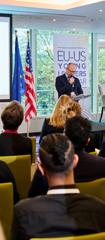
Through collective efforts involving internal and external stakeholders, GMF Leadership Programs conducted an extensive audit and relaunch of this program. MMF began more than 40 years ago and has become the premier transatlantic fellowship for mid-career professionals seeking to improve their leadership skills, gain a global network that spans multiple social sectors, further their commitment to democracy, and be immersed in a yearlong fellowship that highlights the importance of the transatlantic relationship. MMF’s relaunch in autumn 2024 featured updates to ensure its continued success for and impact on the 24 European and American fellows who comprise the 2025 cohort.
GMF partnered with the European Commission and the US Department of State on an effort to strengthen the bonds among young European and American leaders, thereby solidifying a robust transatlantic relationship. The seminar’s seventh iteration in 2024 brought together 50 participants from EU- and US-funded educational exchange programs to discuss the security implications of climate change.
This 12th iteration of this fellowship focused in 2024 on the role of inclusive leadership in collective liberation. TILN brought together 24 leaders from historically marginalized backgrounds and a wide range of professional sectors for six months of distance learning culminating in one week of immersive in-person workshops, seminars, guest lectures, and peer mentorship in Brussels. TILN fellows worked together to find better ways to advance social cohesion in their fields of work. They also had the opportunity to attend GMF’s flagship annual conference, Brussels Forum, and speak with a panel of GMF leadership program alumni and the audience of high-ranking representatives of politics, business, academia, and civil society who gathered to discuss the need to build pipelines of transatlantic leaders.
Nineteen young leaders from Armenia, Georgia, Moldova, and Ukraine participated in this program’s 2024 iteration, which provided skills and resources to advance their work in bolstering democracy and economic development, strengthen their networks, and broaden their knowledge about regional, European, and transatlantic issues.
GMF believes that these programs represent only the start of fellows’ relationships with the organization. The Leadership Programs team keeps an alumni community of now more than 4,000 intergenerational leaders engaged and informed through regional alumni gatherings, alumni newsletters, virtual briefings, and public events, and by providing insights into the future of GMF’s fellowship programs.
more than 200 alumni contributed to the Marshall Memorial Fellowship audit and relaunch
more than 250 applications received for the 24 places in the 2025 Marshall Memorial Fellowship
24 leaders from diverse backgrounds participated in the 2024 Transatlantic Inclusion Leaders Network
19 leaders participated in the 2024 Policy Designers Network
50 young leaders participated in the 2024 EU-US Young Leaders Seminar
13 regional alumni events hosted in Austin, Berlin, Chicago, Dallas, Detroit, Houston, Los Angeles, New York, Raleigh/Durham, San Antonio, San Francisco, Tbilisi, and Washington, DC


GMF is guided by four core values
GMF affirms and seeks to further the fundamental democratic principles of individual and opposition rights, rule of law, representative government, transparent and accountable institutions, free and fair elections, protections for marginalized communities, and freedoms of expression, religion, and the media. These values are reflected in all GMF work to build, defend, and deliver democracy in the United States, Europe, and worldwide.
GMF seeks diverse voices and views, open discussion, and exchange of ideas internationally and within the GMF community. We are committed to behavior and approaches founded in appreciating and recognizing all GMF staff and partner contributions. GMF believes that diversity is crucial to advancing our mission and workplace, and that our institution should reflect the international community in which we work and serve.
GMF is committed to integrity, the highest standard of individual professional conduct, intellectual independence, objective and fact-based analysis, and intellectual rigor from our staff and our partners. We hold ourselves accountable to our institutional values and our human and fiscal resources.
GMF seeks to achieve our mission by rigorously evaluating the impact of our efforts across policy and programmatic work, civil society engagement, and thought leadership. The question of impact should be core to any GMF event, convening, or product from the time of inception. 1. Democracy Affirming
All GMF representatives—trustees, employees, and affiliated associates—are expected to uphold the organization’s values in the conduct of their professional activities, including writing and publishing, convening, talent management, board membership, revenue development and expenditure, investment strategy, and networking.
GMF, as a living memorial to the Marshall Plan’s strong American leadership, robust cooperation of allies, and delivering hope through advancing democracy, is guided by these powerful ideals and values. Our implementation of them may be imperfect, but we guard against complacency by consistently exploring opportunities for improvement. We strive to achieve impact, and the values that guide our work are fixed, firm, and enduring.
as of December 31, 2024
Christopher Schroeder (Chair), Author, Entrepreneur, and Venture Capitalist
Annie Maxwell (Vice Chair), Executive Vice President, Omidyar Network
Steve Biegun, Senior Vice President of Global Public Policy, The Boeing Company
Joyce Chang, Chair of Global Research, JP Morgan Chase & Co.
Helene Cooper, Pentagon Correspondent, The New York Times
John Emerson, Vice Chairman, Capital International, Inc.
Frank Friedman, CEO and President, Imperial PFS
Susannah Gray, Trustee, German Marshall Fund of the United States
David A. Greene, President, Colby College
Tara Hariharan, Managing Director of Global Macro Research, NWI Management LP
Heidi Heitkamp, former US Senator, North Dakota
Thomas “Tad” Kelly, Co-Founder and Managing Partner, CHB Capital Partners
Janet Lamkin, Trustee, German Marshall Fund of the United States
Curtis “Mike” Scaparrotti, Senior Counselor, The Cohen Group
William “Mac” Thornberry, former US Congressman and former Chairman, US House of Representatives Committee on Armed Services
Shawn Turner, General Manager and Director of Broadcasting, WKAR Public Media
Margit Wennmachers, Operating Partner, Andreessen Horowitz
J. Robinson West (Chair Emeritus), Managing Director, Center for Energy Impact, Boston Consulting Group*
*Chair Emeriti are nonvoting advisers to the board of trustees.
January 1-December 31, 2024
$1,000,000 and above
$100,000$999,999
Anonymous
European Commission, Directorate-General for Enlargement and the Eastern Neighbourhood
Global Affairs Canada
Air Liquide
Alfred Landecker Foundation
Bernard and Anne Spitzer Charitable Trust
The Boeing Company
Brookings Institution
Compagnia di San Paolo
Embassy of Norway, Belgrade
Embassy of Switzerland, Belgrade
Embassy of the United States, Athens
European Commission, Service for Foreign Policy Instruments
European Union, Delegation to the Republic of Moldova
Federal Foreign Office, Germany
Federal Ministry for Economic Cooperation and Development
Federal Public Service Foreign Affairs, Foreign Trade and Development
Cooperation, Belgium
The Gambrell Foundation
General Dynamics Land Systems
Henry Luce Foundation
Meridiam
Ministry for Foreign Affairs, Sweden
Ministry of Defense, Republic of Latvia
Ministry of Foreign Affairs, The Netherlands
Mission of Japan to the European Union
North Atlantic Treaty Organization
Northrop Grumman
Open Society Foundations, New York
Policy Center for the New South
Sandler Foundation
Sasakawa Peace Foundation
Stiftung Mercator
Taipei Economic and Cultural Representative Office in the United States (TECRO)
Union of Chambers and Commodity Exchanges of Turkey
William and Flora Hewlett Foundation
$10,000$99,999
Amazon
Anonymous
Autodesk
Cabinet of the French Prime Minister
Calouste Gulbenkian Foundation
Cleveland Foundation
Conoco Phillips
Correctiv
Danske Medier
Dataminr
Deloitte
Embassy of Japan, Washington, DC
ExxonMobil Corporation
Foundation Asia Pacific Peace Studies
Foundation for Polish-German Cooperation
Friedrich Naumann Foundation for Freedom
Global Taiwan Institute
Heinrich Boell Foundation
Huntington Ingalls Industries
Intel
Japan Bank for International Cooperation
Japan External Trade Organization (JETRO)
New York
Japan External Trade Organization, Belgium
KBR Limited
Koç Holding A.S.
Konrad Adenauer Foundation
Leidos Holdings
Lockheed Martin L’Oréal
Mastercard Inc.
MBDA
MedOR Foundation
Mercedes-Benz
Michelin
Microsoft Corporation
Ministry for Foreign Affairs, Finland
Ministry for Foreign Affairs, Sweden
Ministry of Defense, Latvia
Ministry of Europe and Foreign Affairs,
France
MITRE
Munich Security Conference
News Media Finland
Northrop Grumman
Oracle
Palo Alto Networks
Public Power Corporation
Qualcomm
$1,000$9,999
Raiffeisen Bank International AG
Saab AB
SNF Agora Institute
Charles Stolting
Swedish Media Publishers’ Association
Taiwan Foundation for Democracy
Turkish Industry and Business Association
Unitas Communications
Visitbrussels
Vodafone
Wallenberg Foundations
Casey Family Foundation
Krassimir Katev
Ministry of Foreign Affairs, Estonia
Matthew Oresman